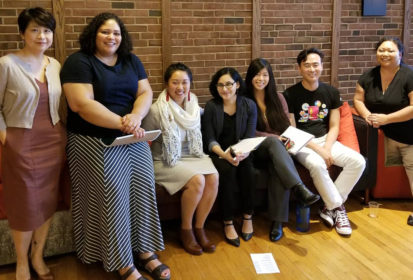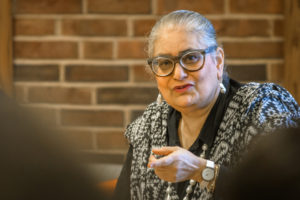‘Crazy Rich Asians’ inspires a wealth of conversation at Clark

As “Crazy Rich Asians” topped the box office three weeks in a row, the Clark community gathered to talk about the cultural impact of a romantic comedy featuring all-Asian lead characters.
Directed by Jon M. Chu, the film tells the story of Rachel Chu (Constance Wu), a Chinese-American professor who travels with her fiancé, Nick Young (Henry Golding), to Singapore, home to his wealthy, transnational Chinese family. Nick’s mother, Eleanor (Michelle Yeoh), looks down on Rachel’s lower social class, and tries to drive the couple apart.
The University’s Center for Gender, Race and Area Studies (CGRAS) hosted the Sept. 12 panel-led discussion in Dana Commons’ Fireside Lounge. Eight panelists shared their reactions to the film, many discussing the significance of seeing Asian characters featured so prominently in a Hollywood blockbuster.
“I left the movie with a huge grin on my face,” said Maria-Elisa Gallant, who works in Clark’s Office of Diversity and Inclusion. Born in the United States of Filipino descent, she grew up in the American South, watching movies starring Tom Cruise and Ben Affleck. She rarely saw Asian films, let alone films featuring dashing Asian male characters who beckoned the audience’s gaze.
“I had no idea how much I needed to see this movie. I was watching it and, and saying, ‘Wow, this is what it’s like'” to see beautiful people of your ethnic group on screen.
Lex Jing Lu, assistant professor of history, acknowledged the “feminization of Asian-American male characters” that typically occurs in American films, but is absent from “Crazy Rich Asians.” Said the Chinese native who has lived in the United States for a decade, “I’m still learning how to be Asian-American in this society.”

Most significant, according to Gallant, is that Asians are appearing in a wildly successful Hollywood “rom-com” – something unheard of even a year ago. “Crazy Rich Asians,” based on the first in a series of novels by Kevin Kwan, had raked in over $165.7 million as of this past weekend, making it the highest-grossing romantic comedy in the U.S. in a decade.
Some in the audience acknowledged the film is problematic in many ways, including how it showcases – and only subtly critiques — wealth. “What are we celebrating?” one audience member asked. “Are we celebrating the Asian-ness, or the richness?”
Betsy Huang, director of CGRAS and associate professor of English, saw little critical force in the movie. She wondered, “If the novels were written as satirical criticisms of wealth in Singapore, did that translate to film? John Chu shows that white privilege has been handed over to Asians, but how is the audience encouraged to feel about that?”
One example, Huang pointed out: The scene where Nick’s mother, Eleanor, who has just bought a hotel in London, figuratively takes the keys to the hotel from a white British gentleman stepping out of an elevator. The scene signifies the “descent of old British and European colonial power and the handing of the power to the Chinese, which resonates with the Western rhetoric of the ‘rise of China.’ ”
Similarly, staircases are used in the film to depict wealth, as they do in stories of British aristocracy, like the PBS series “Downton Abbey” and Henry James novels. “When Rachel walks up to the landing, she goes right, then she goes left. She doesn’t know which way to go,” Huang recalls. “Eleanor pushes Rachel down one step, off the landing. It’s Eleanor saying, ‘You cannot ascend.’ ”
Racism also is on display, speakers pointed out. Darker-skinned South Indian guards appear threatening, and the wealthy Chinese in Singapore are light-skinned.

Many spoke about the differences — and the tensions — depicted between the Asian and Asian-American characters, and this has trickled out into movie-going audiences as well. While scores of Asian-Americans have embraced the film for showcasing an all-Asian cast, Chinese audiences don’t read the film the same way, and others don’t like the depiction of exorbitant wealth in the Chinese diaspora.
Nadine Knight, associate professor of English and Africana studies at College of the Holy Cross, recalled how disparate audiences in the African diaspora received the blockbuster film “Black Panther,” subject of a CGRAS-sponsored discussion at Clark last spring. Some African audiences zeroed in on the fake accents and contrived depictions of their continent, while African-American audiences were thrilled to see an all-black cast.
“We’re saying this movie is great, but it’s very problematic,” said one audience member who identified herself as Chinese. “It’s important to be critical.”
Other panelists included Parminder Bhachu, professor of sociology; Gohar Siddiqui, assistant professor of screen studies; Amanda Morelli of the Office of Multicultural and First Generation Student Support; and Jean Dao ’12, M.A.T. ’13, Huang’s former student and now program coordinator for Harvard University’s Public School Partnerships Program.


